 One of my pet peeves, so to speak, is the concept of “unconditional love” as attributed to dogs by humans. It is a popular way of romanticizing dogs and while I am loath to be the Grinch who stole unconditional love, there are reasons why I think this “compliment” is over- and misused in the context of human-dog relations.
One of my pet peeves, so to speak, is the concept of “unconditional love” as attributed to dogs by humans. It is a popular way of romanticizing dogs and while I am loath to be the Grinch who stole unconditional love, there are reasons why I think this “compliment” is over- and misused in the context of human-dog relations.
I first began thinking about the concept of unconditional love after my beloved husky, Kobi, passed away a few years ago. Did Kobi love me unconditionally? Hell, no! But I loved him unconditionally, and this unique feeling, awakened by my relationship with him (which had many challenges), became a cause for serious reflection. At the time I did not question whether other people were correct to wax poetic about how unconditionally their dogs loved them. I just thought I had that certain odd dog: independent of spirit and in no way loyal, a wild-at-heart canine who felt the confines of living within human society more so than the more slavish breeds (or mixes thereof). That was my dear Kobi, whom I always imagined thought of me as being the “food-lady” and “walk-lady,” and not much more. Moreover, I remember with chagrin times when I would cry bitter tears over yet another mess created or willful act of destruction and wonder why Kobi did in fact not love me, perhaps even disliked me! I ruefully laugh about this now, as being the expression of human narcissism it is, but I’m certain the tacit expectations that accompany the cultural ideal of unconditional love were rattling around in my head. Whatever it was, my dog did not have it for me, which led to feelings of inadequacy, which, well… you see where putting unrealistic expectations on dogs can lead! The desire for unconditional love is a human desire, and many mistakes begin when humans look to dogs to fulfill their psychological and emotional needs.
But I digress. The point being that after Kobi passed, I marveled at how fiercely I loved him for all those years in the absence of practically any positive reinforcement on his behalf, and I thought that was a pretty neat capacity we humans have, and wondered why this might not be the more lofty potential result of genuinely sharing our lives with a dog – this awakening in us, as opposed to elevating and celebrating their so-called capacity to love us “no matter what.”
However, that’s as far as I took this train of thought, as it applied to one particular dog, my Kobi. Only later did I start to think critically about this concept broadly as it is so often applied to the idealized human-dog relationship. If I were so inclined, I could tell myself Alec loves me unconditionally. As opposed to Kobi, he very reliably responds to his name and comes when I call him, and seems to enjoy spending time with me, and never tries to run away from me when off leash. He displays a genuine preference to be at my side rather than elsewhere. Unlike aloof Kobi, Alec gets visibly excited when I come home, whether we have been apart for five minutes or five hours, and seems overjoyed to see me. Yet, does this mean he loves me unconditionally?
Leaving aside questions of whether and what kind of emotions nonhuman animals experience (the plethora of rich studies coming out of the field of cognitive ethology on a regular basis would leave a skeptic hard-pressed to argue that animals do not have complex emotional lives; how similar these emotions are to ours is an interesting question, but also a potential minefield for misplaced anthropomorphism [note that I am also critical of the term “anthropomorphism,” but that is a topic for another day]), let’s take a critical look at the idea of unconditional love as humans apply it to dogs in American culture.
There are a few problems with this concept; perhaps most importantly, it rather conveniently ignores power dynamics. Dogs in American culture are utterly dependent upon their owners (despite the increasing popularity of the term “guardian” among animal protection advocates, we are in reality their “owners” and this is an important distinction under the law) for everything, from the bare necessities like food, water and shelter, to higher order social and psychological needs like companionship, exercise, and mental stimulation. In this way, they are similar to children, who don’t have much of a choice about loving their parents for the simple fact that until a certain age, their parents constitute their whole world. It is well-known that children continue to love parents who abuse and neglect them just as children love parents who provide a loving and secure environment. Unconditional love takes on a twisted and tragic meaning in this and similar contexts, but at root are the powerlessness of the one who supposedly loves unconditionally and the privileged position of the one who is the recipient of this fabled “love without strings.” In a relationship where one party has all the power, it is facile and self-serving to suppose that the powerless one loves the “master” unconditionally. This facet of the dominant ideology serves to legitimize and mask power relations inherent in the dog-human relationship. For, despite the fact that more people define their pets as “family members” in surveys, the sad fact is that this is very much a provisional status, which can be (and all too often is) terminated at will by the member of the relationship who is not legally defined as property, and therefore has the absolute authority to do the defining (and subsequent re-defining).
We live in a country in which countless healthy dogs are relinquished to shelters each year (approximately half of whom are killed) for reasons that range from trivial and entirely fixable behavioral problems, to not wanting to put in the time and effort to find a home that will accept pets, to simply not having enough time to spend with the one-time “family member.” If this is unconditional love, I’d hate to imagine what the conditions would be! I cannot say if all of the people who give up their dogs each year for lifestyle reasons in happier times claimed their pet loved them unconditionally, but it’s a fair bet in a society in which this is a prominent, if contradictory, cultural belief.
What got me started thinking about this most recently was an ad I saw on the Portland Craigslist. I never go on the “pets” section of CL, but I was looking for something specific and while there I was surprised and depressed to see all the “free to good home” ads (surprised because for some reason I thought CL disallowed this type of listing, but apparently they only prohibit sales of animals). Out of curiosity, I clicked on a listing that advertised a free pair of Weimaraners. The ad showed a picture of two dogs, a mother and son, and contained a story about how the owner had fallen on rough times during the recent “economic storm” and could no longer keep these cherished family members. After a few paragraphs detailing the charms of the breed and of these two dogs in particular, the person giving her dogs away had the gall to list as a requirement that the new owner love them “unconditionally.” Holy shit – are you kidding me?
The above scenario, and the countless others like it, exemplifies the other reason why this concept, beautiful and poetic though it may be, is problematic: “unconditional” is an adjective describing a verb: love. Yes, love is in the end a verb, an action, or it is meaningless. This applies to human–human relationships too. But many dog owners treat it as something squishy, just a feeling that can come and go and be transferred to the next owner. No matter how well-intended, this exalted term has been bled of meaning, dubious in its application from the first. The fact that someone would have the lack of self-awareness to demand that the new owner of the dogs she herself is giving away love them unconditionally is revealing. In a society where dogs are legally defined as property, a status reflecting the dominant social values already in place, unconditional love is a fiction, something which can be given and taken away at the whim of the more powerful, in other words, the antithesis of unconditional.
So to quote that old jazz standard, down with (unconditional) love! Let’s be more truthful. At its barest, dog’s love for humans is need-based and human’s love for dogs is capricious and non-binding. While my love for Alec does not fall into this latter camp, nor does it describe the feelings of many of my friends for their dogs, our commitment to our canine charges does not reflect the dominant order. I most assuredly do love Alec unconditionally and I daresay it is the most powerful, beautiful force that exists – a primary force giving rise to other secondary emotions and actions. But I resent this concept being co-opted to the point where a person giving her dogs away on Craigslist can invoke it with straight face and lack of embarrassment at her own hypocrisy. If I sound angry, it’s because I am. It saddens me deeply to know that erstwhile canine “family members” are being put to death in “shelters” every day. Calling attention to the cultural myths that help enable this shameful situation may be akin to shouting into a hurricane, but how long will we as a society, as individuals, allow this to continue?
In the end, whether dogs love us unconditionally is to me the less interesting question than are we capable of loving them this way? And perhaps we need to ask ourselves: why do we need them to love us unconditionally? What hole in our psyches does this fill? What is this deep rooted desire to be loved for simply existing? Dogs are not tools that exist to pump up our egos; I would propose we instead endeavor to earn their love by doing our best to fulfill their species-specific needs. I believe this challenge – and it is an ongoing challenge – is the essence of unconditional love.
PS Alec continues to do amazingly well and the Portland move has been good to us. More updates soon!

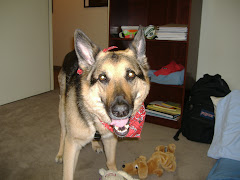

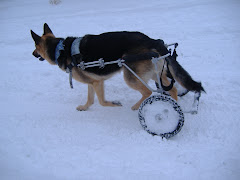
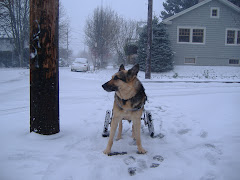
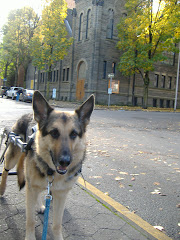
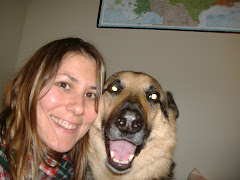
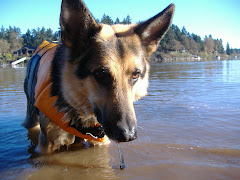
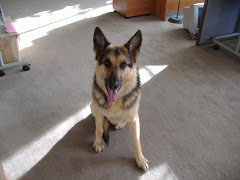
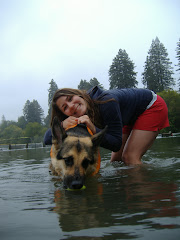_9_19_08+030.jpg)
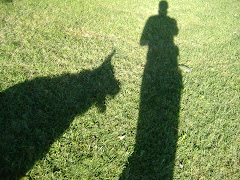
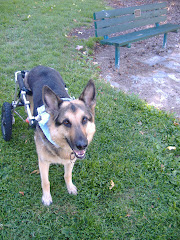
_9_19_08+045.jpg)
_9_19_08+001.jpg)
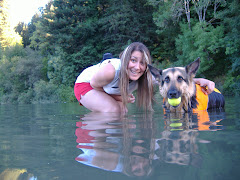
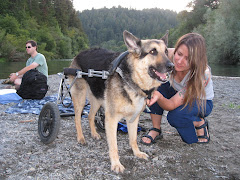
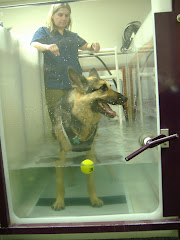
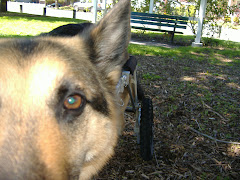
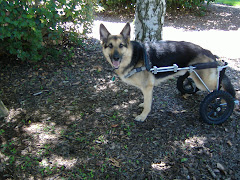
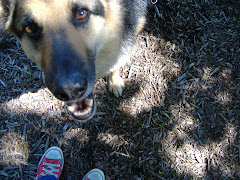
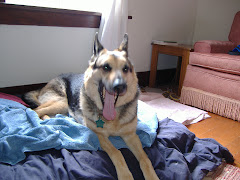
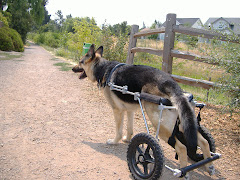
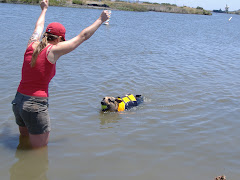
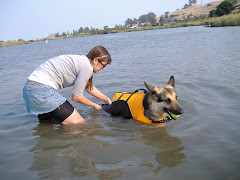
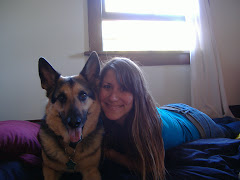
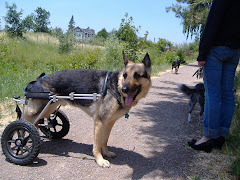
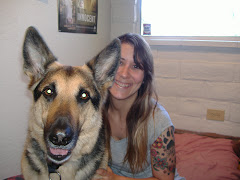
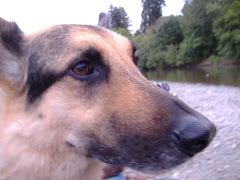
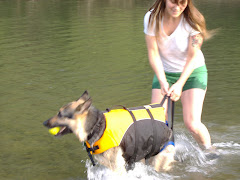
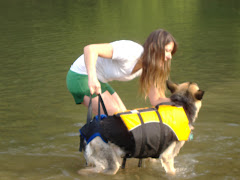
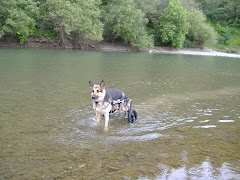
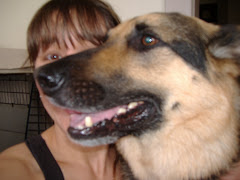
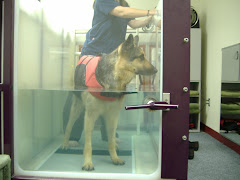
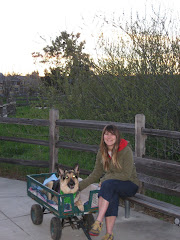
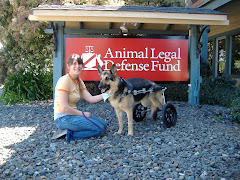
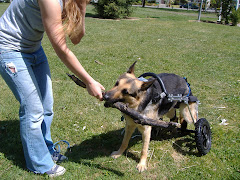

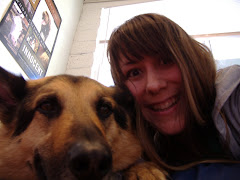
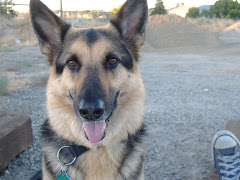
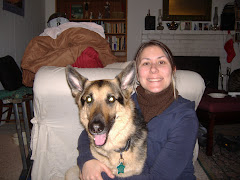
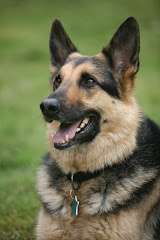
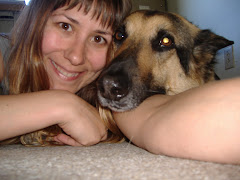
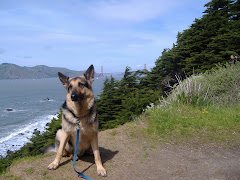
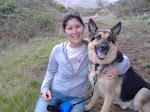
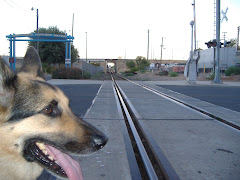



4 comments:
This made me weep! Your writing is very poetic and on point. I appreciate the depth of emotion and scholarly touch you put on this entry. You hit the nail on the head and even the most devoted 'owners' like myself must always question the reality of domestication and what is coming out of it... I can't think I am a saint whose cats just bow before her, when in reality as much as the 'love' me, they might run loose if allowed!! I must hold in perspective my love for them and their love for me and keep in mind the layer of dependence that exists whether I want it there or not. PS - You rock and I am soooo glad to know you.
Nicole, I just found your blog through Animal Person this morning, and I haven't been able to stop crying since. Alec's story is amazing, and he's so lucky to have such a caring, devoted guardian. Most "owners," when faced with a similar situation, would opt to "euthanize" their "pet," or pass the "problem" off to others via Craigslist, Freecycle or the like. Your courage - and Alec's, of course - is truly inspiring.
I'm going to go snuggle my own five dog-kids now. Well, except for Jayne, who's more like your Kobi - aloof and only affection at mealtime!
I found your blog the same way kelly g did, and like her I cried through much of the story. And oh yes, I went back to the beginning and read every single word.
I volunteer at an animal sanctuary every weekend, and one of the young pigs recently suddenly lost the use of his rear legs. At 9 months old, he's already 200 lbs, so this is a really big deal. He's recovering now, turns out it was (they believe) an abscess on his spine that put pressure on his nerves, and the antibiotics have helped.
His story isn't much like Alec's, other than the fact that he is improving, and that the doctors didn't have much hope for his recovery at the beginning. The hope has to come from us most of the time, I think.
You are awesome for sticking there with Alec and believing in him and making sure he had the best possible chance at recovery. And for blogging about it. Reading his story gives me hope.
"In the end, whether dogs love us unconditionally is to me the less interesting question than are we capable of loving them this way?"
This is exactly how the animals in our lives become our greatest teachers. You've articulated it perfectly, Nicole.
Post a Comment